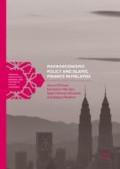Abstract
Risk sharing is the organizing principle of Islamic economics and finance that promotes financial inclusion, development, and distributive justice. The use of risk-sharing instruments is the distinctive feature of the Islamic financial and economic system. An Islamic economic system is a market-based system with rules of behavior and clear rule-enforcement mechanisms to reduce uncertainty in transactions and to ensure an efficient operation. It emphasizes on social and moral values, priority of the rights of society, trustee-stewardship role of man on worldly resources, recognition and preservation of human dignity, immutability of property rights, and achievement of broader concept of development beyond physical growth. Islamic microeconomic policy tools rely on the risk-sharing features of equity finance as an alternative to reliance on interest rate-based instruments.
Access this chapter
Tax calculation will be finalised at checkout
Purchases are for personal use only
References
Al-Hasani, B., & Mirakhor, A. (2003). Essays on Iqtisad—The Islamic approach to economic problems. New York: Global Scholarly.
Askari, H., Iqbal, Z., & Mirakhor, A. (2014). Introduction to Islamic economics: Theory and application. Singapore: John Wiley & Sons (Asia) Pte Ltd.
Brouwer, M. (2005). Managing uncertainty through profit sharing contracts from medieval Italy to Silicon Valley. Journal of Management and Governance, 9(3–4), 237–255.
Krugman, P. (2009). How did economists get it so wrong? New York Times, 2(9), 2009.
Kumhof, M., & Rancière, R. (2010). Inequality, leverage and crises. (IMF Working Paper, 268) (WP/10/268), 1–37.
Mat Sari, N., & Mirakhor, A. (2012). Islamic monetary policy in Malaysia: A conceptual framework. In 2nd ISRA Colloquium “Islamic Finance in a Challenging Economy: Moving Forward”.
Mirakhor, A. (2009). Islamic economics and finance: An institutional perspective. IIUM Journal of Economics and Management, 17(1), 31–72.
Mirakhor, A. (2010). Whither Islamic finance? Risk sharing in an age of crises. Munich Personal RePEc Archive (MPRA), (56341).
Mirakhor, A. (2012). Islamic finance, risk sharing and macroeconomic policies. Munich Personal RePEc Archive (MPRA), (47061).
Mirakhor, A., & Askari, H. (2010). Islam and the path to human and economic development. New York: Palgrave Macmillan.
Mishkin, F. (2010). Monetary policy strategies: Lessons from the crisis. In ECB Central Banking Conference Paper. Frankfurt.
Ostry, J. D., Berg, A., & Tsangarides, C. G. (2014). Redistribution, inequality, and growth. IMF Staff Discussion Note.
Othman, A., & Mirakhor, A. (2013). Islam and development: Policy challenges. In Z. Iqbal & A. Mirakhor (Eds.), Economic development and Islamic finance. Washington, DC: World Bank.
Rajan, R. G. (2010). Fault lines: How hidden fractures still threaten the world economy. Princeton: Princeton University Press.
Sheng, A. (2009). From Asian to global financial crisis: An Asian regulator’s view of unfeterred finance in the 1990s and 2000s. Cambridge: Cambridge University Press.
Wyplosz, C. (2012). Fiscal rules: Theoretical issues and historical experiences. In A. Alesina & F. Giavazz (Eds.), Fiscal policy after the financial Crisis (pp. 495–525). Chicago: University of Chicago Press.
Author information
Authors and Affiliations
Corresponding author
Copyright information
© 2017 The Author(s)
About this chapter
Cite this chapter
Othman, A., Mat Sari, N., Alhabshi, S., Mirakhor, A. (2017). Islamic Finance, Risk Sharing, and Macroeconomic Policies. In: Macroeconomic Policy and Islamic Finance in Malaysia. Financial Institutions, Reforms, and Policies in Muslim Countries. Palgrave Macmillan, New York. https://doi.org/10.1057/978-1-137-53159-9_4
Download citation
DOI: https://doi.org/10.1057/978-1-137-53159-9_4
Published:
Publisher Name: Palgrave Macmillan, New York
Print ISBN: 978-1-137-53723-2
Online ISBN: 978-1-137-53159-9
eBook Packages: Economics and FinanceEconomics and Finance (R0)

